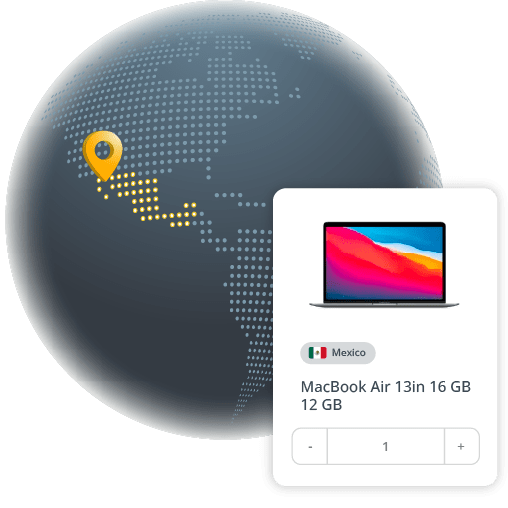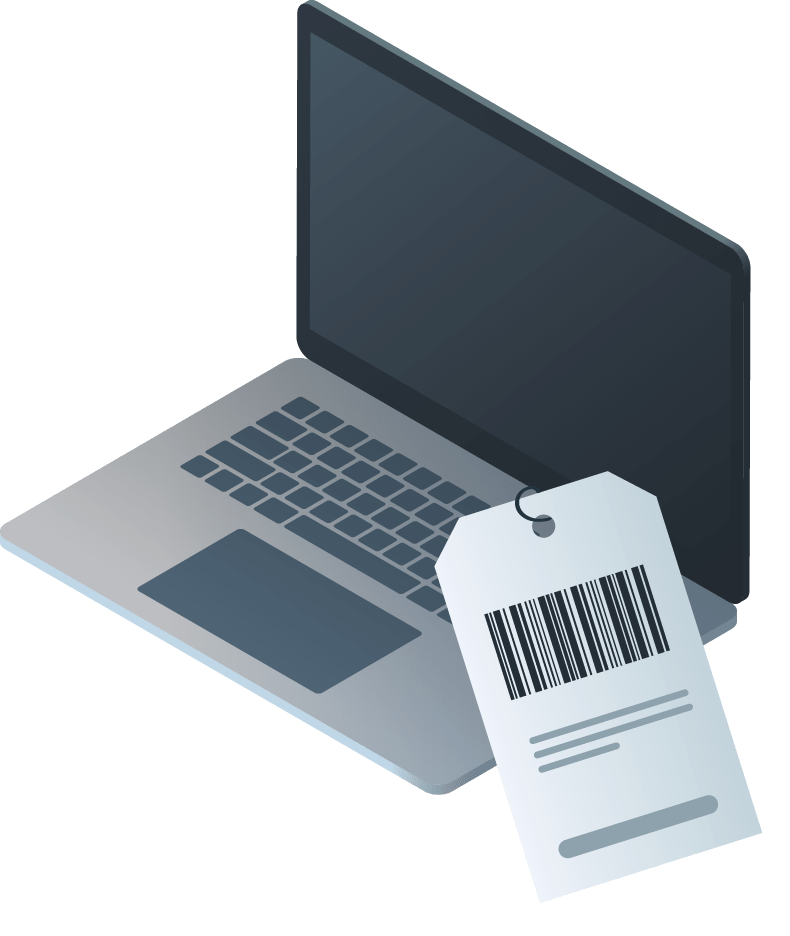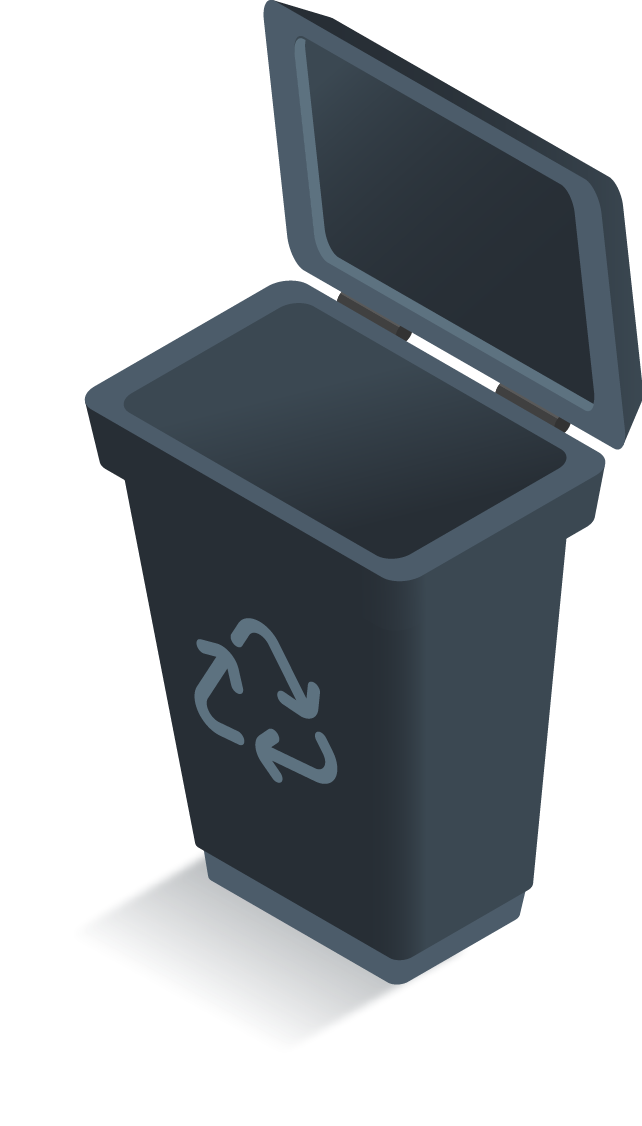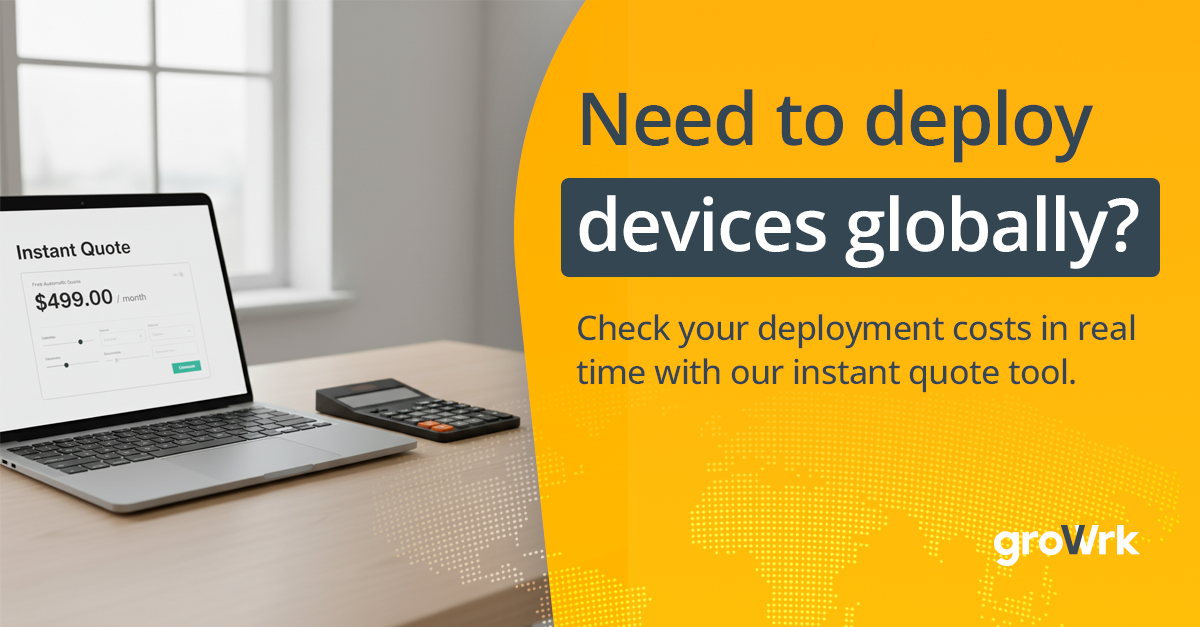How to send IT equipment to Mexico
Looking to send Laptops or other IT equipment to distributed teams in Mexico? GroWrk simplifies IT asset management, shipping, and compliance across borders. Learn how to seamlessly manage logistics, customs, and IT outsourcing for your remote team.

At a glance
Mexico is one of Latin America's largest economies, boasting a strong digital infrastructure and a rapidly growing IT industry. With increasing investments in technology and a government committed to digital transformation, Mexico offers significant opportunities for businesses looking to expand their IT operations.
|
CURRENCY Mexican Peso (MXN) |
OFFICIAL LANGUAGE Spanish |
TIME ZONE CST (Ranges nationally from EST, CST, MST, PST) |
|
CUSTOMS DUTY ON ELECTRONICS 19% Mexico imposes a 19% tax on imports from countries without free-trade agreements, including China. However, imports from the U.S. and Canada are exempt from duties for purchases under $50, with a 17% duty for those between $50 and $117. |
SHIPPING LEAD TIME 5-8 business days Standard shipping from the U.S. to Mexico typically takes 5–8 days, depending on the carrier and specific locations. |
IT OUTSOURCING MARKET $6.74 billion The revenue in the IT Services market is expected to demonstrate a steady annual growth rate of 5.40% from 2025 to 2029. |
Overview of IT operations in Mexico

Expanding IT sector: Mexico's IT industry is experiencing rapid growth, driven by increasing demand for software development, cybersecurity, and tech services.
Government initiatives: Programs like Mexico Digital foster innovation and attract investments in technology.
Skilled workforce: Mexico offers a large, highly skilled, and bilingual workforce, making it an attractive destination for IT outsourcing.
Cost advantages: Competitive labor costs provide businesses with a cost-effective solution for IT services.
Geographic advantage: Mexico’s proximity to the U.S. aligns with North American time zones, enabling seamless real-time collaboration.
Shipping IT equipment to Mexico: What you need to know
| Customs regulations |
| All IT equipment shipped to Mexico must comply with Mexican customs laws. Items must be declared accurately, and specific documentation is required for clearance. |
| Duties and taxes |
When shipping IT equipment to Mexico, customs duties typically include a 16% VAT (Value Added Tax) on most goods. Electronic items may also incur additional taxes depending on their classification. For high-value items, customs duties can range from 0% to 20% depending on the specific product category and its declared value. |
| Required documentation |
|
| Import restrictions |
Certain high-tech items, such as those involving encryption technology, may require special permits or be subject to additional scrutiny. Additional documentation may also be required for used equipment, such as proof of refurbishment or data wiping certificates.
|
| New vs. Used equipment |
|
| Data privacy laws |
Mexico enforces data privacy regulations through the Federal Law on Protection of Personal Data Held by Private Parties (LFPDPPP), which closely aligns with international frameworks like the GDPR. Key compliance factors include:
|
| Penalties or fines for non-compliance |
|
Checklist for sending laptops to Mexico
When shipping laptops to Mexico, it’s important to follow a few best practices to ensure the process goes smoothly, and your equipment arrives safely and on time. Here are some helpful shipping tips:

Select trusted couriers: Choose reliable couriers such as GroWrk, DHL, UPS, FedEx, or Estafeta for international shipping. These carriers offer tracking services and have experience handling Mexican customs procedures.
Check service levels: Select the appropriate shipping option based on urgency. Express shipping (2-5 days) for high-priority deliveries. Standard shipping (5-10 days) for cost-effective options.
Use high-quality packaging: Secure laptops with sturdy, padded boxes and protective materials like bubble wrap, foam inserts, or air cushions to prevent damage during transit.
Disassemble where possible: If shipping accessories like chargers, docking stations, or monitors, package them separately to prevent damage. Remove detachable components if applicable.
Label clearly: Ensure the recipient’s name, address, and contact details are correctly labeled. Mark the package as "fragile" to encourage careful handling.
Accurate product descriptions: On the commercial invoice, provide a detailed and accurate description of the laptop, including its brand, model, and serial number. Inaccurate descriptions may cause customs delays.
Value declaration: Declare the correct value of the laptop to avoid under- or over-declaring, which could lead to customs inspections or fines. The declared value determines any applicable duties and taxes.
Customs declarations: Complete and include necessary customs paperwork, such as the Mexican Customs Declaration (Pedimento Aduanal), Commercial Invoice, and Packing List to ensure smooth clearance.
Proof of origin: If applicable, include a certificate of origin to determine eligibility for duty-free import under USMCA (if shipping from the U.S. or Canada).
Understand import duties & taxes: Laptops are generally duty-free under Mexico’s tariff rules but are subject to VAT (16%) and potential customs processing fees.
Pre-pay duties and taxes: Some couriers offer an option to pre-pay import duties and taxes, streamlining customs clearance and preventing the recipient from paying additional fees upon arrival.
Protect against loss or damage: Consider purchasing shipping insurance for high-value laptops to protect against loss, theft, or damage during transit.
Compliance with Mexican regulations: Ensure compliance with NOM (Normas Oficiales Mexicanas) standards for electronics and environmental regulations like RoHS (Restriction of Hazardous Substances) before shipping.
Use tracking tools: Major couriers provide real-time tracking—monitor shipments closely to anticipate customs clearance updates and delivery progress.
Stay in touch with the recipient: Notify the recipient about the expected delivery timeline, tracking updates, and any customs-related requirements to avoid delays.
Expect weather and seasonal delays: Hurricane season and peak shipping times (e.g., holiday periods, El Buen Fin) can cause delays. Plan shipments accordingly.
Mexican domestic delivery options: For final delivery, consider working with Estafeta, Redpack, DHL Mexico, or regional courier services for efficient last-mile distribution.

Average cost of IT Equipment in Mexico
Laptops (Business Grade):
- Mid-range: $600 - $1,200
- High-end: $1,200 - $2,500+
High-end models such as Apple MacBook Pro, Dell XPS, and Lenovo ThinkPad are priced on the higher end.
Monitors (Business Grade):
- Standard: $150 - $300
- Ultrawide/4K: $400 - $1,000
Monitors from trusted brands like Dell, Samsung, and LG typically range within these prices, with 4K or ultrawide models costing more.
Desktops (Business Grade):
- Standard Desktop PC: $500 - $1,500
- Workstation Desktop (for high-performance tasks): $1,500 - $3,500+
Prices depend on the brand and specifications, with options from HP, Lenovo, and Apple among the most common.
Printers (Laser):
- Standard Office Printers: $150 - $400
- High-Volume Printers: $600 - $2,000+
Leading brands such as HP, Canon, and Brother offer a wide range of models for office environments.
Public holidays & IT work hours to plan your shipment
Key public holidays in Mexico:
- New Year’s Day (Año Nuevo) – January 1
- Constitution Day (Día de la Constitución) – February 5
- Benito Juárez’s Birthday (Día de Benito Juárez) – March 21
- Labor Day (Día del Trabajo) – May 1
- Independence Day (Día de la Independencia) – September 16
- Revolution Day (Día de la Revolución) – November 20
- Christmas Day (Navidad) – December 25
Religious holidays such as Easter (Semana Santa), Day of the Dead (Día de los Muertos), and Religious Festivals based on the Catholic calendar, including the Feast of Our Lady of Guadalupe (Día de la Virgen de Guadalupe) on December 12, also affect work schedules.
Typical work hours for IT professionals
- In Mexico, the standard workweek for IT professionals typically follows a 40-hour schedule, usually from 9:00 AM to 6:00 PM, with a one-hour lunch break. However, many IT professionals, particularly in roles like software development or project management, may have flexible hours or remote work arrangements. These flexible working hours allow IT professionals to better align with global teams, reducing downtime and improving efficiency.
What to consider when retrieving IT equipment from employees in Mexico
| Local delivery and logistics services |
|
| IT Inventory Management |
|
| Logistics challenges for remote locations |
|
| Equipment agreement with employees |
|
How to dispose of IT equipment in Mexico
Data wiping
Before disposing of or repurposing any IT equipment, it is essential to completely erase all sensitive data in compliance with Mexico's Federal Law on Protection of Personal Data Held by Private Parties (LFPDPPP). Businesses should use certified data destruction methods, such as data wiping software or the physical destruction of hard drives, to ensure that no sensitive information is exposed. Compliance with the LFPDPPP is crucial for safeguarding privacy and avoiding potential data breaches.
Recycling
Mexico has specific guidelines for the recycling and disposal of electronic waste. IT equipment such as laptops, monitors, and other electronics must be disposed of through certified e-waste recycling programs. Companies should consult with licensed e-waste disposal providers, such as Reciclaje Ecológico or Greenpeace México, which help responsibly manage and recycle electronic waste. These e-waste recycling programs ensure that equipment is disposed of in an environmentally friendly manner, preventing pollution and supporting the circular economy.
Repurposing
If the equipment is still functional, businesses can repurpose it internally or donate it to educational institutions, non-profits, or other organizations. Donating used equipment is a sustainable option that benefits communities while contributing to corporate social responsibility. However, ensure that all data is erased before repurposing or donating the equipment to comply with data protection laws and protect sensitive information.

Local IT Outsourcing Solutions in Mexico
You can streamline your IT logistics and asset management with GroWrk’s comprehensive global solution. Whether it’s shipping equipment or managing IT assets across multiple regions, GroWrk helps you stay compliant and efficient, every step of the way. Here’s why GroWrk is the ideal partner for managing your IT assets in Mexico:

| 1. Wide global coverage |
| With operations in over 150 countries, including Mexico, GroWrk guarantees seamless IT deployment and management for remote teams. Whether your employees are in Mexico City, Monterrey, Guadalajara, or remote locations, we ensure timely and hassle-free service to keep your business running smoothly. |
| 2. End-to-end asset management |
GroWrk simplifies the entire IT asset lifecycle, covering procurement, deployment, management, and retirement. By handling logistics, compliance, and security, we allow your team to focus on business growth while we manage IT operations. |
| 3. Intuitive platform for easy deployment |
Our user-friendly platform makes it effortless to order, ship, and track IT equipment across Mexico. Employees receive pre-configured, ready-to-use devices, reducing administrative overhead and ensuring seamless onboarding. |
| 4. Smooth delivery and equipment retrieval |
From delivering laptops, monitors, and IT accessories to remote employees across Mexico to retrieving assets from departing team members, GroWrk handles it all. We make the process efficient and fully traceable, eliminating logistical challenges. |
| 5. Compliance with Mexican import regulations |
Mexico has strict customs, tax, and compliance requirements for IT shipments. GroWrk ensures NOM certification, WEEE disposal, and tax compliance, preventing delays, penalties, or unexpected costs. |
| 6. Efficient repairs and maintenance |
We manage hardware repairs, replacements, and maintenance to keep IT assets in top working condition. Whether through on-site servicing or remote troubleshooting, GroWrk minimizes downtime and ensures business continuity. |
| 7. 24/7 Support for peace of mind |
From shipping assistance and compliance management to real-time troubleshooting, GroWrk’s 24/7 support ensures smooth IT operations, keeping your remote workforce in Mexico fully equipped. |
Procure, configure, and deploy your IT devices from one platform


